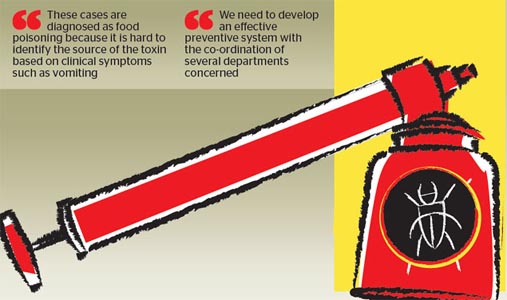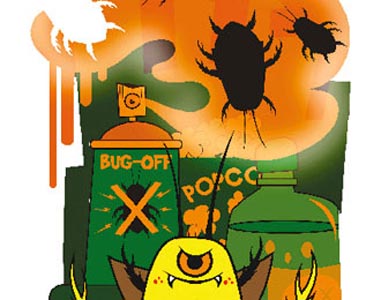Misdiagnosis of pesticide poisoning as food poisoning in some recent cases in the country has prompted the Dubai Municipality to come out with an explanatory note for making the public and the medical fraternity better aware of the real ‘villain’ in such cases.
In an elaborate press statement titled “Vomiting: Is it because of food or fumigant?,” the municipality’s Food Control Department’s officials referred to the news reports about food poisoning cases which are, within a couple of days, changed into cases of chemical poisoning.
“The villain of the story that often occurs during summer is a fumigant used against bed bugs and not food in most cases,” stated the officials.
The statement comes as the Iraqi mother and brother of Farah Ebrahim, who died of pesticide poisoning in Sharjah on July 1, are still fighting for their lives in hospitals. The 11-year-old girl was the latest victim in a spate of pesticide poisoning deaths that have plagued the country in the recent summers.
Khalid Mohammed Sharief Al Awadhi, director of the Food Control Department said many cases that were termed ‘food poison’ at first instance, turned out to be caused by fumigants, after investigations by sections with the authorities concerned.
“These cases are diagnosed as food poisoning because it is hard to identify the source of the toxin based on clinical symptoms such as vomiting. And we normally blame the last meal as the suspected cause of illness,” he observed.
“We need to develop an effective preventive system with the co-ordination of several departments concerned. We should intensify our efforts to curb illegal use of chemicals both by awareness and by stringent enforcement actions.”
He said the Dubai Municipality, along with the Dubai Health Authority, uses an efficient system to follow illness notifications from the hospitals regarding any case of food poisoning.
“We have a special team trained by the United States Centres for Disease Control and Prevention to investigate food-borne illnesses. When we receive the notification, the Food Control Department’s team of investigators acts immediately and contacts the doctors, and the people who are affected to collect the details of their food exposure. This helps us to find any food that could be suspected as the cause of illness and then take adequate measures to protect others if necessary.”
Al Awadhi noted that the department found pesticide poisoning as the cause of illness among a group of men in March 2012 after a joint investigation was conducted by it along with the Pest Control Section of the municipality after it received the notification from the DHA of ‘suspected food poisoning.’
“We contacted the victims and our investigation revealed no common food exposure and we knew that it was unlikely to be a case of food-borne illness as suspected by the hospital.”
During investigation, officials found about 20 cans of Aluminium Phosphide in the neighbouring apartment of the affected people.
“Neighbours had left their apartment for a day after leaving the chemical that was illegally procured. In the cases that occurred before that, we couldn’t do this because the notifications came too late and it is not easy to detect the chemical once the room is ventilated for a few hours.”
Food control expert at DM, Bobby Krishna said: “During summer, we used to get several notifications from hospitals regarding suspected cases of food poisoning often with severe vomiting among several members of the same family. Some of these cases involving children were fatal. After initial investigation, we found that there was nothing in the food history of the person that could be attributed to bacterial poisoning.”
“What we noticed was the pattern of symptoms, the sudden onset of vomiting and sometimes the victims complained about chest burn and severe abdominal cramps. It was also noticed that the affected people stayed in the same room or same flat. However, none of these cases had diarrhea, a classic symptom of bacterial food poisoning or fever, another indicator of bacterial infection. The stool and blood results also came negative with no indication of bacterial toxin.”
The official said fatality occurs when neighbours are unaware of such fumigation and they stay in the room that has toxic case. Such an exposure leads to a severe onset of vomiting and fatality, especially among children who cannot tolerate even small levels of these toxins.
According to Basheer Hassan Yousif, senior food safety specialist at the department, people do not die by food-borne infections within 24 hours. Bacterial infections take time to set in and it could be anything from a day to weeks or months. Organisms such as Salmonella, some type of EColi cause severe illness, and lack of treatment can lead to death. It may take weeks in such cases.
Some bacteria such as Bacillus Cereus, Staphylococcus aureus and Clostridium Botulinum produce toxin in food. Toxins of Clostridium Botulinum can cause serious illness and is always associated with canned foods and foods packed without oxygen. Good epidemiological investigation and a close look at the meal history can tell us whether a common food is involved.
“If a chemical is intentionally added to a food, you would see that all the people who have eaten the food are ill. In case a restaurant is suspected, we can see whether other people who have eaten the same meal are ill or well and identify common foods. In the absence of a common food, environmental exposure has to be suspected. After the massive campaign that we launched last year with the help of media, the number of chemical poisoning cases in Dubai has dropped to almost nil. We have not had any reports this year. But, still we need to keep telling people not to use Aluminium Phosphide, commonly known as the “bomb,” added Yousif.
Municipality officials said rapid notification of illnesses can help to identify the common exposure and stressed that prevention is not possible without the help of the public.
Two days back, the Pest Control section at the municipality, in a statement to public, urged not to resort to illegal persons or companies to get out of the nuisance caused by pests including bed bugs and issued basic instructions to be followed to avoid havocs.
A specialist with the section also revealed that eight pesticide companies were recently shut down by the municipality after they were found to be using pesticides banned for domestic use.
In case of suspected poisoning
The Food Control Department of the Dubai Municipality have suggested the following rules for the public to save human lives in case of suspected poisoning:
•If severe vomiting is noticed, don’t conclude that it is a case of food poisoning. Notify the food control and the pest department immediately. In Dubai, a notification would trigger an investigation to check both food and environmental exposure. You can also avoid the last meal bias by allowing us to investigate. It may not be the food that you think that has caused the illness.
•Notification should be done immediately so that authorities can go and check the premises. Any delay would reduce the probability of finding the problem. •Public should refrain from using such chemicals. Notify the municipality at 800900 if anyone is found selling Aluminium Phosphide, popularly known as ‘bomb.’
•You should also look for signs of fumigation such as bugs falling dead and neighbours sealing their doors with tapes especially during weekends. •Contact a pest control agency approved by the Dubai Municipality for managing pests. Take preventive measures.(KT)



